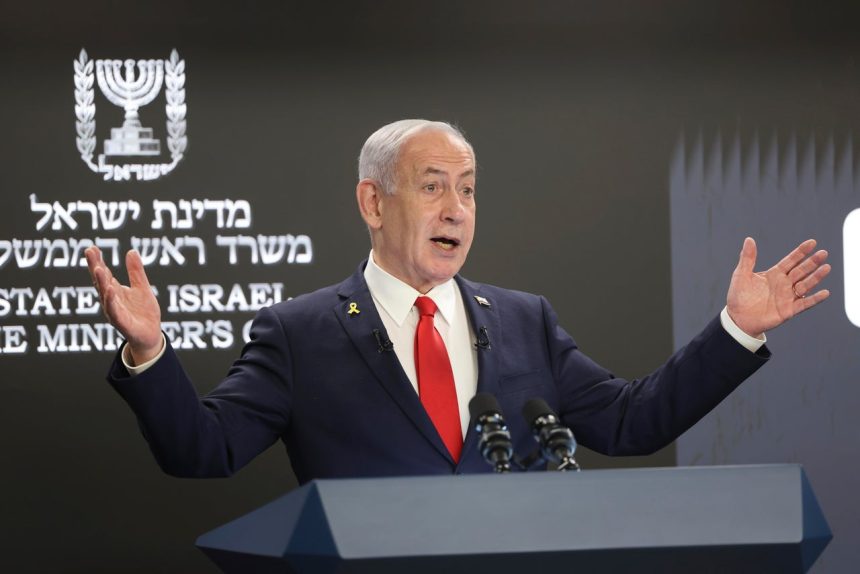Israeli Prime Minister, Benjamin Netanyahu, on Sunday defended Israel’s planned military push into Gaza City, insisting the country “has no choice but to finish the job and complete the defeat of Hamas.”
Speaking in Jerusalem to international media, Netanyahu stressed that Israel does not intend to occupy the territory but rather to “free Gaza.” He added there is a “fairly short timetable” for the next stage of operations.
According to the prime minister, Israel’s objectives include disarming the enclave, maintaining the Israeli military’s “overriding security control,” and placing a non-Israeli civilian authority in charge.
His remarks came two days after Israel’s Security Cabinet approved a plan for the army to seize control of Gaza City, a decision that has triggered widespread criticism at home and abroad.
Critics fear it will worsen Gaza’s humanitarian crisis and place the remaining hostages, taken by Hamas on Oct. 7, 2023, in greater peril.
“We will win the war, with or without the support of others,” Netanyahu vowed.
The press briefing took place just before an emergency United Nations Security Council meeting on Israel’s move to take control of Gaza City.
Netanyahu explained that the Security Cabinet’s plan orders the Israel Defense Forces to eliminate Hamas’ final two strongholds, in Gaza City and the central camps, while moving civilians into “safe zones” offering food and medical care.
“This is the best way to end the war and the best way to end it speedily,” he said.
Netanyahu also revealed he had instructed the military to “bring in more foreign journalists,” noting that access to Gaza has so far been heavily restricted.
He has yet to speak with President Trump about the plan but said he intends to “very soon.”
Meanwhile, U.S. special envoy Steve Witkoff is meeting with Qatar’s prime minister in Spain to discuss making “workable” a joint Egyptian-Qatari proposal for the release of hostages.
Two Arab officials told the Associated Press that the proposed ceasefire deal would see the release of all hostages, both dead and alive, in exchange for ending the war and withdrawing Israeli forces from Gaza.
U.S. Backs Israel at Security Council
At the Security Council meeting, the United States defended Israel’s right to determine its own security measures, rejecting accusations of genocide in Gaza. With its veto power, Washington can block any council resolutions.
Other members expressed alarm. China called Gaza’s “collective punishment” unacceptable, while Russia warned against a “reckless intensification of hostilities.”
“This is no longer a looming hunger crisis; this is starvation,” said Ramesh Rajasingham from the U.N. humanitarian office, describing the situation as “beyond horrific” and beyond words.
More Civilian Deaths as Palestinians Seek Aid
Hospitals and witnesses reported that at least 26 Palestinians were killed in the past day while trying to obtain aid in Gaza.
Nasser hospital said 10 people died near the Morag corridor, between Rafah and Khan Younis, as they waited for aid trucks.
Another six were killed in northern Gaza near the Zikim crossing, according to the Hamas-run Health Ministry and Shifa hospital.
A further six people died attempting to reach distribution sites run by the Gaza Humanitarian Foundation in Khan Younis and Rafah, Nasser hospital said.
However, GHF denied any incidents at its facilities, saying the deaths appeared to involve looting attempts targeting aid convoys.
The Israeli military also reported no incidents involving its troops near central Gaza aid locations.
During the press conference, Netanyahu placed responsibility for the humanitarian crisis on Hamas, accusing it of causing civilian deaths, destruction, and aid shortages.
“Hamas still has thousands of armed terrorists in Gaza,” he said, adding that Palestinians are “begging” the world to be freed from them.
Although he has previously claimed there is “no starvation in Gaza,” Netanyahu acknowledged there is hunger, saying, “there was a problem with deprivation, no question about it.” He expressed a desire to increase aid distribution points but offered no specifics.
